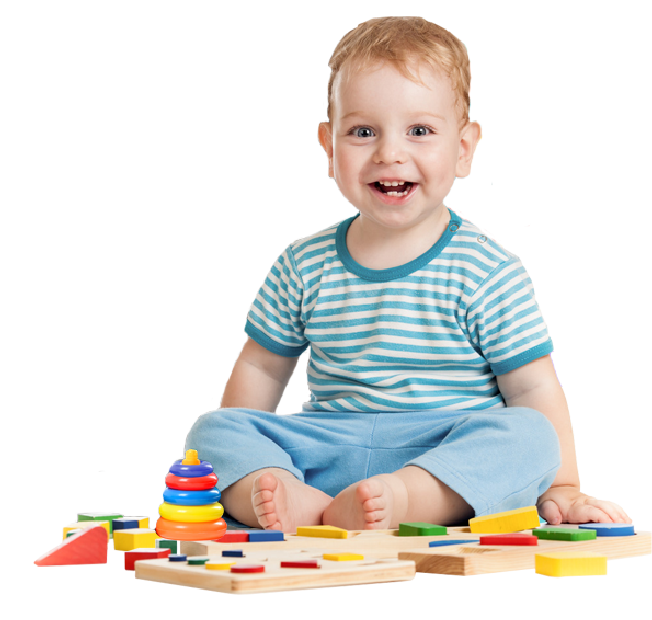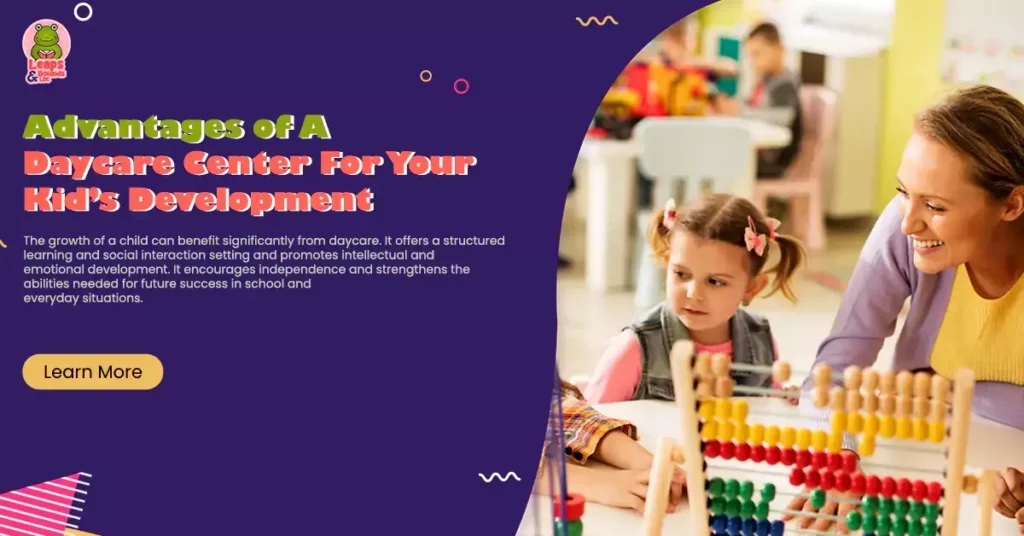The growth of a child can benefit significantly from daycare. It offers a structured learning and social interaction setting and promotes intellectual and emotional development. It encourages independence and strengthens the abilities needed for future success in school and everyday situations.
Read this blog to learn more about the advantages of a daycare center.
What Is The Purpose Of A Daycare Center?
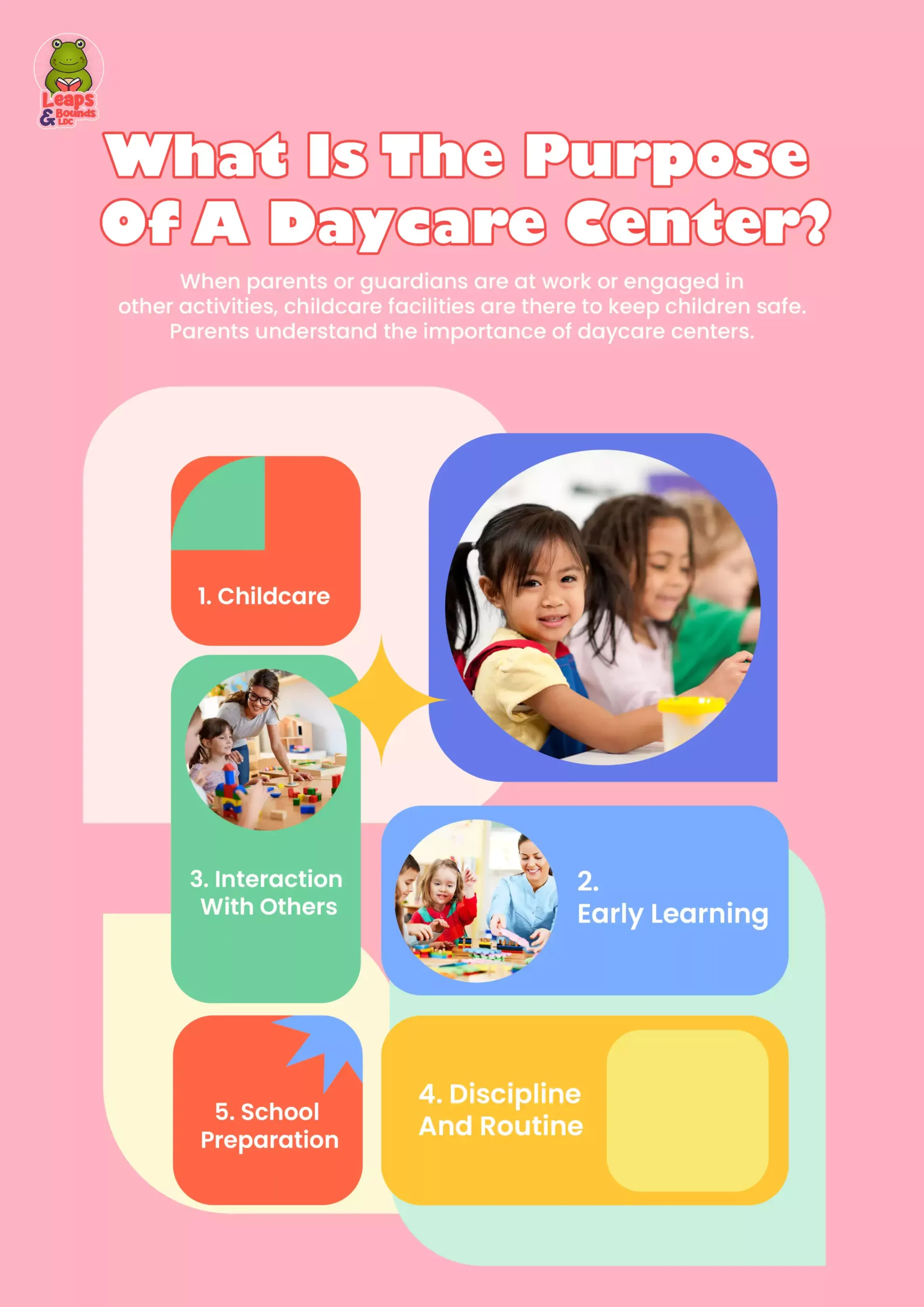
When parents or guardians are at work or engaged in other activities, childcare facilities are there to keep children safe. Parents understand the importance of daycare centers. The daycare provides several essential services. They are:
-
Childcare
They provide parents with a trustworthy and safe environment. They can leave their kids during the day, ensuring their well-being and safety.
-
Early Learning
Childcare facilities frequently provide activities and educational programs that support children’s cognitive, linguistic, and social growth. They give chances for learning and exploration and provide age-appropriate events and activities.
-
Interaction With Others
Children in daycare can socialize with other kids and learn to cooperate and work in groups. They know how to share, communicate, and form friendships to develop emotionally and socially.
-
Discipline And Routine
There is a set timetable for meals, naps, playtime, and educational programs in daycare facilities. These rituals encourage discipline and time management in kids while giving them a feeling of consistency and regularity.
-
School Preparation
Daycares can serve as an entry point for formal education. They help kids become used to routines and follow directions. Children acquire the fundamental skills necessary for a seamless transition to preschool or kindergarten. They also introduce kids to an organized learning environment.
Benefits Of Daycare On Child Development

There are several advantages of daycare to child growth and development. Here are some other benefits:
-
Socialization And Interaction
Daycare facilities offer chances for socializing and collaboration among other children. A crucial ability for creating fruitful connections and achieving future success is learning to share, trade, and solve problems.
-
Cognitive Stimulation
Daycare facilities provide chances for interaction, the growth of social abilities, teamwork, and societal change. Co-learning, retail, and preschool facilities offer age-appropriate activities and educational programs. This is to support children’s intellectual growth.
Storytelling, riddles, and educational games help children enhance their language skills, problem-solving abilities, and general cognitive development. Solving problems effectively is crucial for future success and developing solid relationships.
-
Development Of Emotions
Daycare facilities offer a setting that fosters emotional growth. Children with trained caregivers can recognize and control their emotions. It encourages empathy, self-control, and high self-esteem. For total healthy growth, emotional wellness is crucial.
-
Language Learning
Childcare facilities offer excellent language-learning opportunities through chats, tales, and language-focused activities. This presentation builds a strong basis for future academic achievement by enhancing vocabulary, communication skills, and fluency.
-
Help For Working Parents
Daycare centers give benefits of childcare for parents. They give working parents a dependable and secure childcare option. This enables them to concentrate on their jobs without interruption.
Providing daycare services encourages employment that benefits the family and the economy. This lets parents maintain a balance between their professional and personal lives.
-
Independence and Self-Confidence
Daycare facilities promote independence by giving children age-appropriate jobs and activities that help them learn how to care for themselves. Teaching children essential life skills like dressing, eating, and watching for their requirements boosts their self-assurance and self-esteem.
-
Education And Skill Development
Childcare facilities offer a loving atmosphere where children can participate in various learning and skill-building activities for infants. It supports lifetime learning. They can discover new abilities, explore their hobbies, and provide a solid basis for future academic endeavors.
-
Physical Progress
Daycare facilities frequently include opportunities for physically demanding activities. This includes organized sports and outdoor games. Athletic growth, coordination, muscle strength, and general physical health are all enhanced by exercise.
-
Sensitivity To Cultural Diversity
By engaging with children from all origins, daycare centers expose children to other cultures, customs, and viewpoints. This display encourages cultural sensitivity and diversity appreciation and broadens viewers’ perspectives on the globe.
-
Preparation for School
The childcare facility aids in preparing kids for the change from daycare to school. They establish structural routines and educational practices for tiny tots that mimic the classroom setting.
This behavior lessens anxiety and helps a youngster adjust to change, increasing their preparation for preschool or kindergarten.
Social Benefits of A Daycare
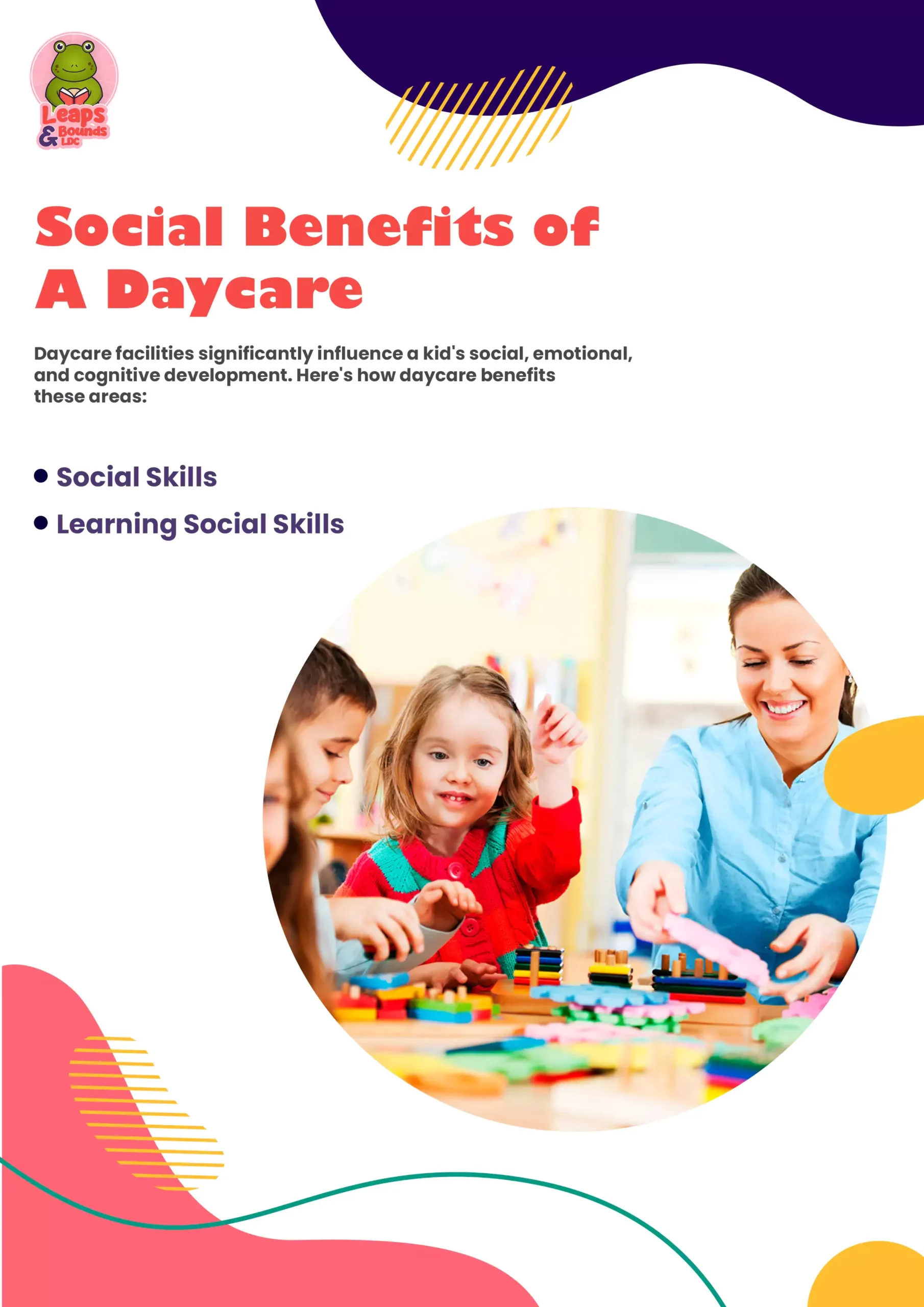
Daycare facilities significantly influence a kid’s social, emotional, and cognitive development. Here’s how daycare benefits these areas:
-
Social Skills
Daycare aids in developing critical social skills. They allow children to socialize with fellow kids in a monitored and organized setting. Children develop their ability to successfully share, exchange, collaborate, and communicate via ongoing engagement.
-
Learning Social Skills
Children get instruction on communication and behavior modeling as they develop their social skills. Children are guided and taught appropriate social conduct by trained caretakers. These are the great benefits of daycare for one-year-old.
We at Leaps and Bounds are dedicated to giving your child a nurturing, educational, secure, nurturing atmosphere. We work hard to offer enjoyable and exciting experiences that promote your child’s development, education, and overall well-being.
Disadvantages Of Daycare For Child Development

There are a few disadvantages of daycare as well. They are:
-
Lack Of Personalized Attention
Paying attention to each child’s unique needs, preferences, and learning styles in a childcare situation might be challenging. This is because they are responsible for many children.
-
Limited Influence Over The Learning Environment
Parents cannot control the teaching strategy or curriculum used at daycare. The center’s curriculum might not precisely match a parent’s preferences or ideal educational objectives for their child.
-
Exposure to Different Values And Viewpoints
Depending on their religious background, children can come across various cultures, beliefs, and practices in daycare settings. Children may become confused or in conflict as a result of these experiences. This necessitates parents to mediate conversations and reaffirm family values at home.
-
Less Involvement Of Parents
Parents may need more control over their kids’ regular contacts, activities, and experiences while attending a childcare facility.
This decreased parental participation and influence might cause parents to feel disconnected from their children. They might feel as though they have no control over their development.
-
Potential For Negative Influences
Interactions with other children in childcare facilities can occasionally result in conflict, immoral conduct, or harmful influences. These situations test a child’s social and emotional development while offering possibilities for learning and progress.
-
Limited Exposure to Family Values
Kids can limit their exposure to their family’s values, traditions, and practices if they spend much time at daycare. They could have fewer chances to take part in cultural or familial traditions.
It is essential to remember that these disadvantages can vary based on the daycare — also, the particular requirements and circumstances of each child and family.
To find out what services are offered, you can get in contact or visit a daycare facility. This will also aid in your ability to be satisfied regarding your child.
Tips For Choosing The Best Daycare
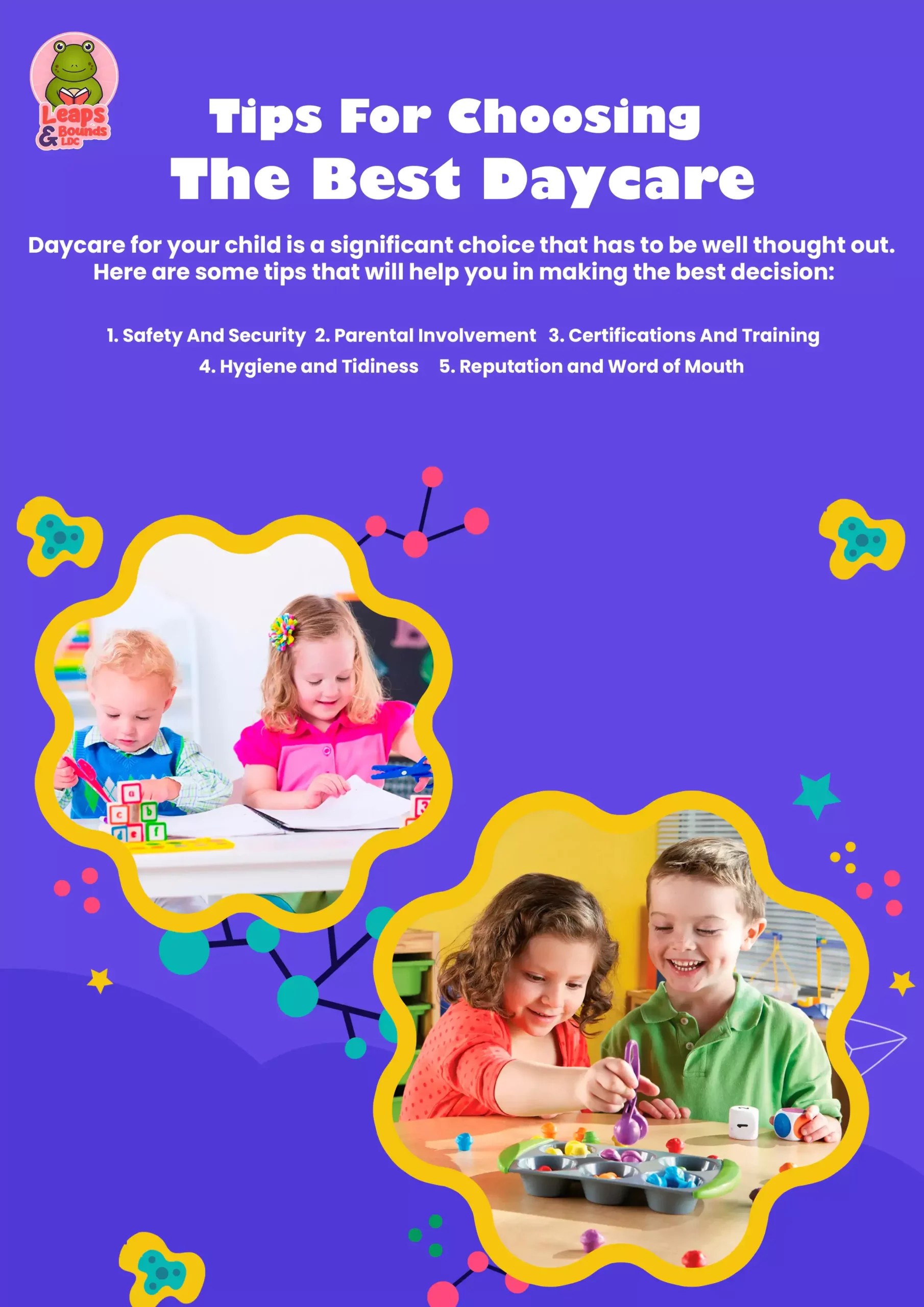
Daycare for your child is a significant choice that has to be well thought out. Here are some tips that will help you in making the best decision:
-
Safety And Security
Verify that the daycare center you are considering has the necessary safety precautions. Look for child-friendly rooms, protected play spaces, and secure entrances. Inquire about their emergency response plan and how to handle health and safety concerns.
-
Parental Involvement
Look into the daycare’s parental engagement policies. Seek out possibilities for open communication, such as frequent updates, parent-teacher conferences, and chances to use daycare services. It is essential to look for daycares that encourage parent involvement.
-
Certifications And Training
Inquire about the training and experience of the childcare workers. Verify their background check certifications. Your child’s health and development depend on them. So, make sure they are qualified and compassionate professionals.
-
Hygiene and Tidiness
Check the hygiene and cleaning practices at the childcare. Verify they have hygienic food preparation techniques, spotless diaper-changing areas, and suitable hand-washing procedures. To prevent the transmission of infections, it is crucial to keep the environment clean and hygienic.
-
Reputation and Word of Mouth
Examine the preschool’s reputation by reading internet reviews and requesting suggestions from other parents. Think about visiting the institution and observing how the staff and kids interact. Credible recommendations can provide essential details regarding the caliber of daycare.
Conclusion
In conclusion, childcare has numerous positive effects on a child’s growth. They offer a disciplined learning environment, promote social and interpersonal interactions, and support intellectual and emotional development.
Daycares promote independence and set kids up for academic and social success. These facilities are crucial to children’s effective and successful schooling.

